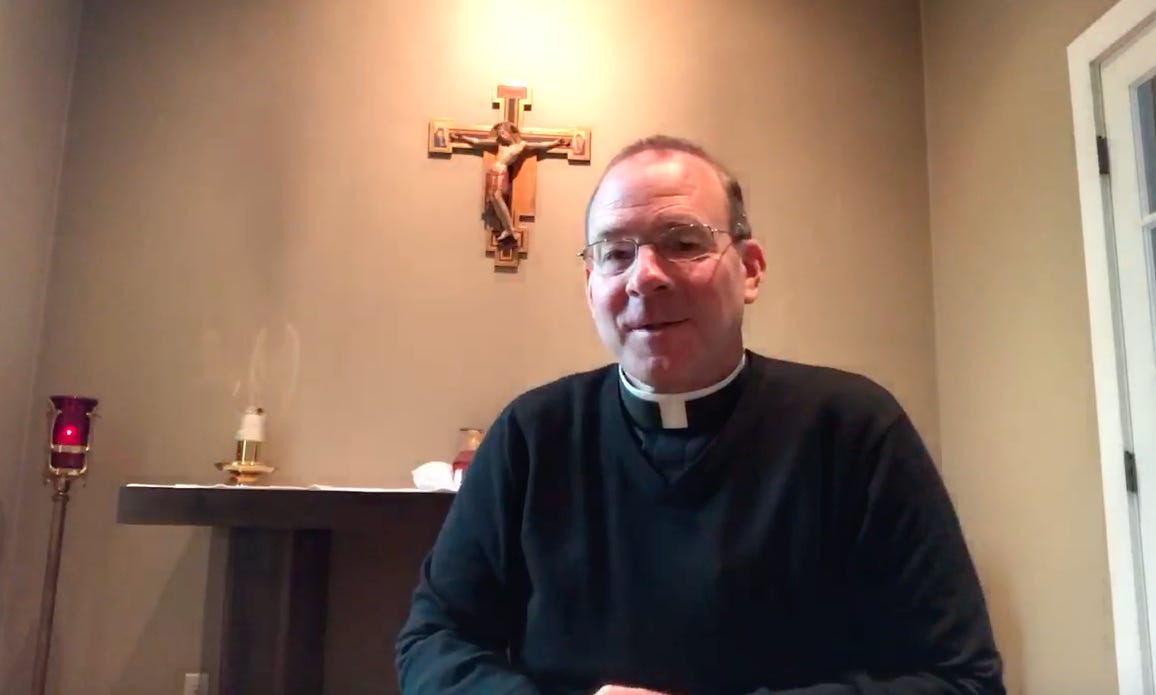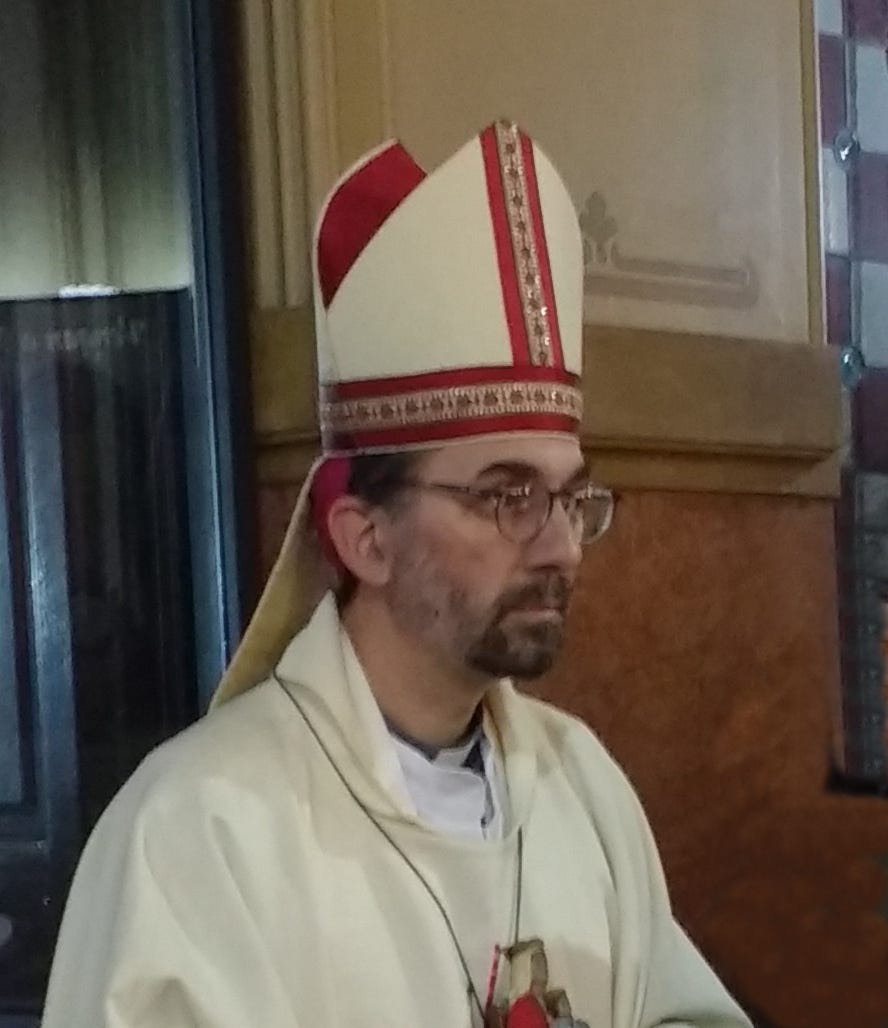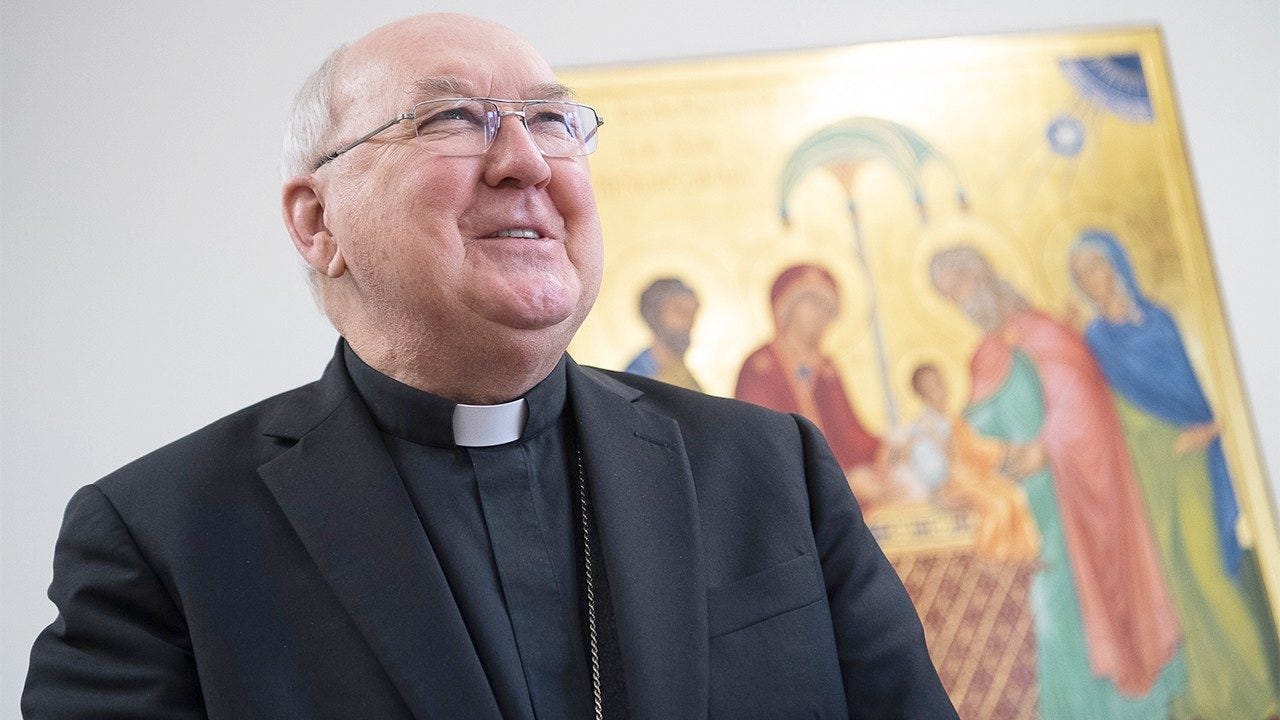The Pontifical North American College announced Wednesday that Msgr. Tom Powers will begin a term as the seminary’s rector in July, succeeding current rector Fr. Peter Harman.
Powers spoke with The Pillar March 30 about his preparations for leadership at the American seminary in Rome.
This interview has been edited for length and clarity.
Msgr. Powers, congratulations on your appointment. This is a big change for you.
Yes, this is the biggest “yes” of my priesthood, and I made it on the Feast of the Annunciation. So it’s very exciting, and also there will be some sacrifice, but I am very excited about it.
—
Monsignor, you have had a lot of different experiences in the Church, and of course, you are a graduate of the NAC and were a spiritual director there.
As you begin this term as rector, how do you understand those things coming together to shape your own mission at the NAC?
I have had great opportunities as a priest and they have all come just from saying “yes” to God — I’ve never asked for anything, and I’ve never said “no” to the Church. I certainly didn't ask for this or seek this out.
And so my hope is that I can help form young men to become priests who give a Marian “yes” to the Lord — Men with the heart of Christ, who serve their people with the love and charity of the Lord.
I think that’s what I’ve always tried to do as a priest, is to always just give that yes to the Lord, whatever he asks of you, even if it becomes a great sacrifice.
What is unique about what’s offered at the NAC? A bishop can choose to send a man to a seminary in the U.S., nearby to home, which is often easier in many ways. So what’s unique about being formed at the NAC?
There are amazing opportunities in Rome.
In fact, I wrote a letter to Fr. Harman to be read at the announcement today, and I mentioned the different opportunities that we have in Rome — from the Scala Sancta to the spaghetti bowl, from the cupola to the cup of gelato, etc.
I think the uniqueness of the NAC is that a man understands the universality of the Church, the history of the Church, the great tradition of the Church by living in Rome, absorbing all of that, and then bringing that back to the local Church so that he can share with the people that sense of the Catholic Church’s real universality.
I think that can be learned, certainly, anywhere, with studies and with travel, but to be for four or five years in Rome, and to absorb all that Rome offers, especially the tradition — I think that’s important to bring back to the people.
It adds to one’s ability to speak about the Church, to preach. And I think it’s a whole new dimension for a man.
—
When the NAC’s board of governors and the Congregation for Clergy looked at you, what do you think they saw that fit with this position? Why is Monsignor Powers right for this important job?
There are, in my mind, worthier men than me to take on this role. And I’ve told them that, actually.
But I think that I do have a unique set of experiences: I was the spiritual director of our seminary here in Bridgeport for four years, I have an experience of Rome as a seminarian myself, and then 10 years in the Congregation for Bishops.
I speak Italian and Spanish, and I’m now a pastor.
I suppose they wanted someone who’s got some well-rounded experiences, and hopefully can fit in well with Rome, who knows Rome, who knows the college itself well. I suppose that was a big part of it.
—
I notice that you have a licentiate from the Pontifical John Paul II Institute for Marriage and Family — and I am not aware of a previous NAC rector with that particular formation, which focuses on the human person in a particular way. How might that contribute to your formation of seminarians at the NAC?
I think Christian anthropology is under attack, and I think it’s important that we all understand that.
That Christian vision of the human person, as well the importance of family, which is also under attack, and the importance of the dignity of each human person, were really foundational principles in our studies at the JP II Institute. And I think that’s a unique perspective.
I found my degree from the JP II invaluable in helping couples prepare for marriage, and in talking to families, and in teaching virtue courses to young people. So I think that unique perspective will be helpful also in the formation of the men.
Monsignor, I don’t know if you followed the process of your own appointment, but it was somewhat protracted — there was a consultation of the metropolitan archbishops of the U.S., which is not an ordinary step, for example. Do you know much about that process?
I did not follow it. I really only know from what I have heard, and it seems to have taken a little bit of time involving that consultation of the U.S. archbishops. I really don’t know much more than that — I didn’t follow it, but here we are.
—
I suspect some part of that consultation might have been that enrollment has dropped at the North American College - a few years ago, it was over 200, and in 2021 there were 148 seminarians at the NAC.
Is there a sense of needing to address that?
I am still getting up to speed on what’s happening at the seminary, as you can imagine — I accepted this position just days ago.
But I suppose a lot of it is simply vocations in general — other seminaries are experiencing that as well.
But I think part of it was also COVID — Italy of course was hit very hard and I think some dioceses were hesitant to send guys over for that.
My understanding is some dioceses had to bring their men home. So I think COVID and the general vocation situation are probably the main causes of why the numbers may be down, but again, I am still learning about this.
I hope to bring the numbers up, and that bishops send their guys to the NAC.
It’s a great place to be formed.
A few bishops have told me over the past few years that they have a desire to keep their men together at one seminary. There is always a chance that a guy who studies at the NAC can feel like a bit of an outlier in his class.
I agree that it’s important that a man be studying at the NAC with another man from his diocese when it’s possible, even if they may not be in the same year. I think it's important to have that fraternity.
When I was in Rome, living there as a spiritual director, I would join the Bridgeport seminarians to get together weekly, to pray night prayer together and talk, and that was helpful. And that has even helped today, when those men are back here in the diocese, they’re good friends and they get together still.
So I think that’s important if a guy can at least have someone from his diocese at the NAC to talk with and get together with, and to pray together, because they’re going to be serving the People of God together in their same diocese.
—
Since 2018, when the McCarrick scandal emerged, there have also been some allegations of impropriety or misconduct at the NAC, and even a lawsuit against the seminary which alleged sexual misconduct.
Obviously, you are still getting up to speed, but I wonder if you can speak about moral formation - human moral formation - at the NAC, and preparation for celibacy, in light of the changes in the Church since 2018.
I really can’t comment on what’s happening, or the perception of what has happened, because I’m just not familiar enough with it yet, to be honest. I believe the lawsuit you mention was dismissed, but I am just not familiar with that.
But moral formation is an essential part of what we do. Moral formation is not listed among the Church’s four pillars of priest formation — intellectual, pastoral, spiritual, and human, because it’s part of all of those. And I think that’s key.
I am eager to get to the NAC, and talk with the faculty, and the students, and learn a lot. This is my first day! But I do think that real moral formation is an integral part of forming priests. And of course I am looking forward to learning more about a lot of things at the North American College.
You mentioned pastoral formation for seminarians. The NAC is far from most typical American pastoral settings. How are men prepared at the NAC for pastoral ministry?
The men at the NAC have an evening each week where they receive direct formation for pastoral ministry, which is very helpful. It’s a lecture, so that evening is not hands-on, but every seminarian, throughout his time at the college, is out every week, hands-on: helping the poor, visiting hospitals, teaching CCD to students, working in a college program.
So every student at the North American College, by the time he finishes there, has already had four years of really serving people hands-on. So when he comes to the parish, he will already be prepared to continue to serve people in the same way.
—
Monsignor, graduates of the NAC are sometimes said to be very particular about liturgy. In fact, there’s a joke:
‘How do you know if you’re in the sacristy with a NACer?’
‘Don’t worry, he’ll let you know.’
[Laughs] Yeah. [Laughs]
My experience from Rome, when I was living there, the liturgies are very, very beautiful.
But my experiences with seminarians that I’ve met [recently] is that they’re all very handy in the sacristy and know what they’re doing, and they love the liturgy and they’re dedicated to it. I have a deacon at the parish who did not go to the North American College, and he is just excellent liturgically.
But the NAC, yes, also offers a very beautiful liturgy all the time, and that is a blessing.
More broadly, there is sometimes a stereotype repeated that seminarians at the North American College can become quite clerical, the joke is that perhaps they are formed for the ‘transitional presbyterate.’
Do you think that’s an accurate stereotype?
I think a kind of clericalism can happen anywhere, that’s not exclusive to the North American College.
In fact, in my experience with the seminarians at the NAC, is that these are men who have made a sacrifice — they’ve left family, they’ve left their country.
And my experience has been that they are dedicated young men who want to serve the Lord and serve the Church — that is my experience of the large majority, if not all the men.
And I think that Fr. Harman has done a wonderful job as rector. I think he has really helped to make the NAC a place where guys are formed in the heart of Jesus. And that’s a great thing.
What do you think the new Ratio fundamentalis on priestly formation will mean for the NAC? I’m wondering about the call for a propaedeutic year — a year of spiritual formation.
The details of that year are still being worked out for the U.S. between the USCCB and the Congregation for Clergy, but I wonder if you’ve thought about what a propaedeutic year at the NAC might look like?
I am waiting to see the new Program of Priestly Formation, when it comes out, and I’m looking forward to talking with Fr. Harman and getting up to speed on that question.
So I think we’re waiting to get up to speed as the new PPF comes out, and then the NAC will follow the PPF.
I am looking forward to that as part of my learning curve in this position.
Thank you. What do you want bishops, and your seminarians to know about your own priesthood, and your life and experience as a priest?
I’d like them to know that it is a great joy to be a priest. That we find joy in serving the Lord through his people, and that there’s nothing greater that we can do than to serve the Lord.
And if we’re called to do that as priests, it’s a joyful, wonderful life, and fulfilling. And I really want to help more men to know the heart of Jesus, and to go out and give their lives for the sake of others, and to care singularly about the salvation of souls.




